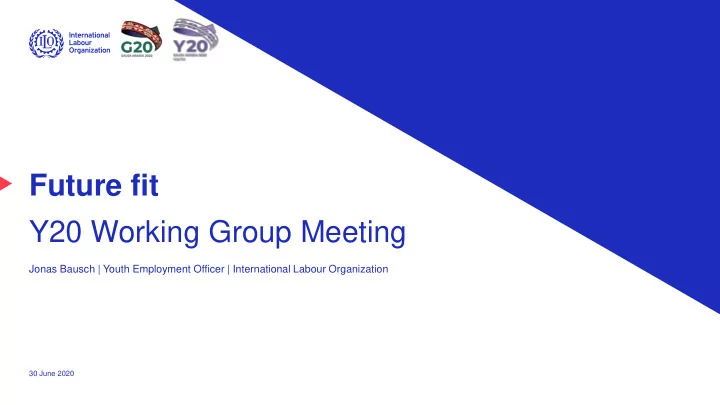

Future fit Y20 Working Group Meeting Jonas Bausch | Youth Employment Officer | International Labour Organization 30 June 2020
Young people are increasingly at risk of labour market exclusion
3 Insufficient job creation in G20 countries, has left 154 million youth Not in Education, Employment or Training (NEET) 2 out of 3 young people with NEET status are women 44 million G20 youth are unemployed 36 million young people are working but poor Advancing social justice, promoting decent work
4 Employment quality and decent work deficits remain an issue New forms of work can expose young people to vulnerabilities Informal employment is widespread Formal 39% Employment Earnings Working hours security G20 Occupational Collective Social protection Safety & Health bargaining Informal 61% Source: ILOSTAT, ILO Modelled Estimates, November 2019. Youth Voices: Consultations on the Future of Work
5 Disrupting education and impeding school-to-work transitions, COVID-19 adds to the existing labour market challenges young people face (1) Disruptions to education, training and work-based learning Closure of schools, universities and TVET institutions Shift online challenging for youth in low-income countries (and low-income households around the world) (2) Difficulties for young jobseekers to find gainful employment Job vacancies have collapsed since the outbreak Risk of increased skills-mismatches and downward pressure on wages (3) Job and income losses & deteriorating quality of employment Young people historically more affected by recessions Youth pre-COVID over-represented in hart-hit sectors Advancing social justice, promoting decent work
6 A Global Survey on Youth and COVID-19 finds systematic, deep and disproportionate impacts of the pandemic on young people, particularly among the most vulnerable 73% of students report their schools have closed 1 out of 6 surveyed young people has stopped working 65% 51% Of student report to be learning less of young workers report a decrease in working hours 60% 42% of students think their education will be delayed or might fail of young workers report a decrease in income Advancing social justice, promoting decent work
Technological change and digitalisation come with opportunities and risks for young people
8 In advanced G20 countries, vulnerable employment has increased, reflecting in part the expansion of the gig economy and platform work 10 Young (15-29) Prime-age Adults (30-49) 5 0 -5 Source: ILO calculations based on the Labour Force Micro Database, version 1.5 Advancing social justice, promoting decent work
9 … work in the digital economy offers opportunities but there are calls for (international) regulations (1) Local service provision (2) Web-based digital labour platforms (ride- sharing, delivery,…) (IT programming, web development, routine clerical tasks) Flexibility Low and unstable earnings Labour market access to No social protection as “independent” contractors disadvantaged groups Lack of inclusion in bargaining processes and social dialogue International regulations, voluntary code of conduct, National-based regulations investments to upgrade platforms to allow social security payments,… Advancing social justice, promoting decent work
10 Risk of automation is highest in jobs held by young people Probability (risk) of automation by age in OECD and low- and middle-income countries Signs that automation accelerates during and after economic crisis Young workers often “last - in” but “first - out” Source : ILO calculations based on PIAAC Public Use Files on Survey of Adult Skills (2012 and 2014) and STEP Measurement Household Survey (2012 and 2013). Advancing social justice, promoting decent work
A human-centred agenda to make the future of work work for young people
12 Principles and policies for a human-centred agenda for the future of work Protect young people in economic downturns Social dialogue • Expand job retentions measures • Including employers and workers in policy making • Strengthen income support • Youth rights, voices & participation • Expand training opportunities Gender equality Support youth labour market entry & boost job • Equal sharing unpaid work quality • Good-quality part-time work • Active labour market programmes for • Eradicate all gender-based violence disadvantaged groups • Promote entrepreneurship through training and Global solidarity access to finance • Update employment & social legislation for diverse • Humanitarian and development support forms of work • Refugees and migrants • Invest in high-quality, cost-effective employment services Advancing social justice, promoting decent work
Thank you … the floor is yours.
Recommend
More recommend